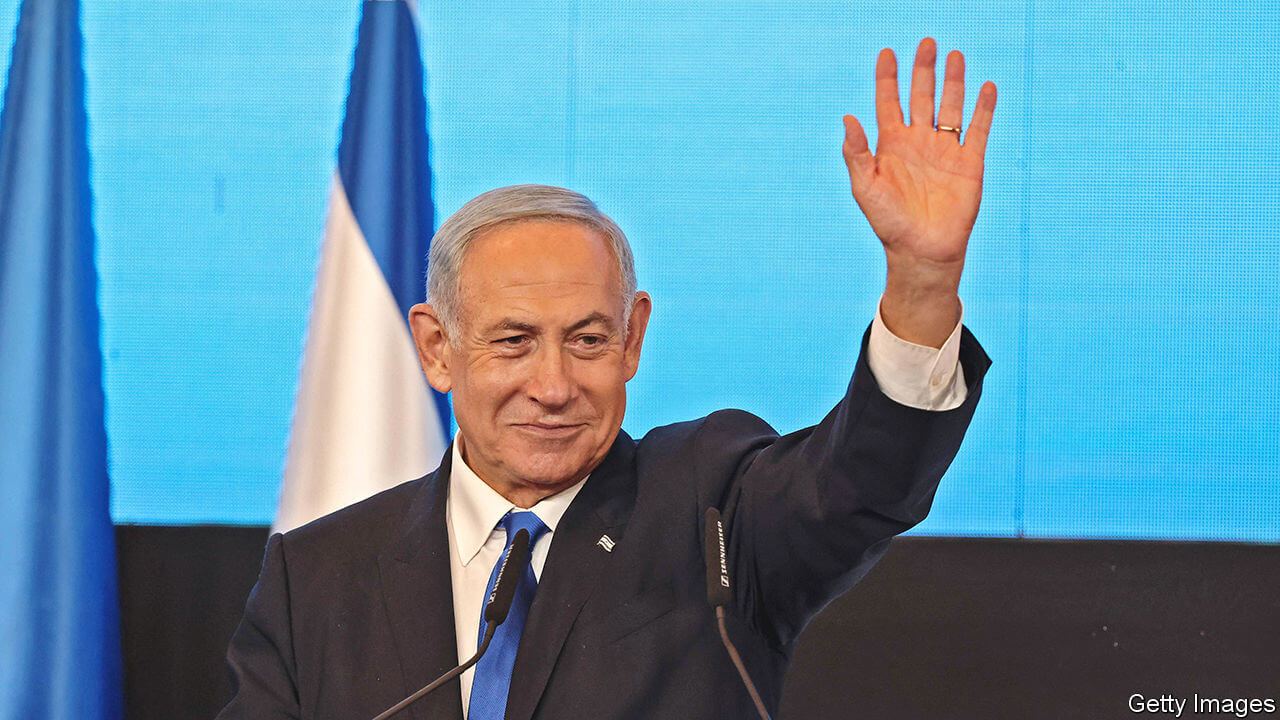After five general elections in four years, a group of like-minded parties in Israel have managed to cobble together a stable coalition led by former Prime Minister Benjamin Netanyahu, ending a protracted period of political stagnation. While Netanyahu’s victory has given Israel much-needed relief from the uncertainty that has pervaded the country since 2019, his win also portends an end to efforts to resurrect peace talks with Palestine.
While the previous Israeli government collapsed a year after its formation due to internal differences, it managed to take several steps aimed at mending ties with the Palestinians. This included a $155 million loan to the Palestinian Authority (PA), the approval of construction for thousands of Palestinian homes in the West Bank, the provision of tens of thousands of work permits to Palestinians, plans to introduce 4G technology in the West Bank, and numerous measures aimed at easing the 14-year-old Egyptian-Israeli blockade on Gaza. The previous government also repeatedly expressed its support for a two-state solution, including Prime Minister Yair Lapid and Defence Minister Benny Gantz.
While these measures could not bring Israel and Palestine to the negotiating table, they were steps in the right direction, exemplified by the fact that a majority of Palestinians supported these measures and the PA welcomed some of the moves. This reaction was in sharp contrast to when Netanyahu was last in power, when both the PA and Israeli government were not on talking terms and tensions were at the highest level in decades.
In fact, Netanyahu has criticised the previous government’s policies and even indicated that he might reverse them, a move that would dent any possibility of peace talks for a long time. Netanyahu has accused now-former PM Naftali Bennett of caving to the Palestinians and displaying “weakness.” He said the incentives given by the Bennett government to the Palestinians have led to “an increase in the number of terrorist attacks and criminal acts,” warning that when terrorists “see this weakness they raise their heads.”

He has also condemned Bennett’s successor, Yair Lapid, for declaring that Israel supports a two-state solution at the United Nations General Assembly (UNGA) in New York. “Lapid is bringing the Palestinians back to the forefront of the world stage and putting Israel right into the Palestinian pit,” Netanyahu said, accusing Lapid of “endangering” Israel by trying to revive the issue of a Palestinian state. Netanyahu’s allies also accused Lapid of “surrendering to terrorism” and “dividing” Israelis.
By rejecting a two-state solution for peace, the Netanyahu government has essentially rejected the PA as a partner for peace, given that its, leader Mahmoud Abbas, is a supporter of the two-state formula.
Netanyahu has further aggravated the situation by promising to expand settlements. The former PM has promised to revoke the 2005 disengagement law, which saw Israel completely removing all settlers from Gaza and a limited number from the West Bank, and has said he will allow settlements in the West Bank region of Homesh, which was evacuated in 2005. Additionally, he has vowed to support settler housing projects in West Bank settlements, something that would further alienate the Palestinians.
Adding more fuel to the fire, Netanyahu has allied with ultra-conservative parties like Religious Zionism and is planning on giving key portfolios to extremist lawmakers like Bezazel Smotrich and Itamar Ben Gvir. The United States, and even the United Arab Emirates, which recently normalised relations with Israel, have warned that including politicians like Ben Gvir in the cabinet would jeopardise ties.
#BREAKING: At the UN General Assembly Israeli Prime Minister Yair Lapid says he supports a two-state solution between Israelis and Palestinians.
— Moshe Schwartz (@YWNReporter) September 22, 2022
"We have only one condition: That the future Palestinian state will be a peaceful one." pic.twitter.com/6NvbAd7Gs0
Gvir and Smotrich are both fervent supporters of increasing settlements in the West Bank and have even praised settler violence against Palestinians. They are also firmly opposed to the idea of Palestinian statehood and have called into question the loyalty of Israeli Arab citizens. Gvir, in particular, has advocated for expelling “disloyal” Arabs. He has also intentionally inflamed tensions in volatile regions like Sheikh Jarrah in East Jerusalem by visiting the area. His visit to Sheikh Jarrah last year was one of the reasons used by Gazan militant group Hamas to start an 11-day war with Israel.
It is thus no wonder then that the Israeli media has called Netanyahu’s coalition the most extreme government in Israel’s history. One American Rabbi has likened Ben Gvir to David Duke, the head of the US white supremacist group Ku Klux Klan (KKK) for his anti-Arab statements.
The rise of an extremist religious orthodoxy in Israeli politics has coincided with the growth of Islamist militancy in the West Bank. Copycats of Gaza’s Hamas, like the Lion’s Den, have tried to stake their claim in the West Bank and challenge the authority of the PA, which has seen a drastic decline in popularity, as many Palestinians see it as a corrupt body incapable of representing Palestine’s true interests.
The Lion’s Den has already caused major security challenges for Israel’s military and is allegedly receiving weapons from Hamas and Hezbollah. With the PA’s rising unpopularity and the growth of extremist rhetoric in Israel, a scenario in which the West Bank becomes a hotbed for militancy is not far-fetched. Such a situation would not only sound the death knell for peace talks but also risk turning the West Bank into a Gaza-like dystopia.
Against this volatile backdrop, the probability of another major conflict erupting is extremely high. With all its rhetoric against a two-solution and its inclusion of far-right members allergic to the idea of Palestinian statehood in the Cabinet, Netanyahu risks propelling Israel and the region into another bout of violence, potentially even greater than the 11-day conflict in 2021.
Therefore, a Netanyahu government would not only render the prospect of Israel and Palestine returning to the negotiating table virtually impossible but may also push Palestinian groups to a point where it will become extremely difficult to undo the damage, both for Netanyahu and future governments.

